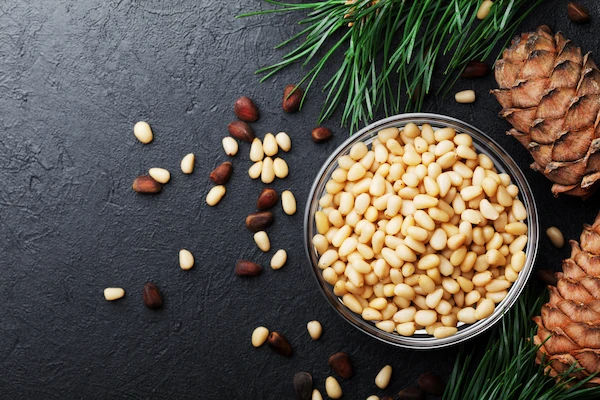Cheed Benefits
Discover the top health benefits of cheed (pine nuts), from supporting heart and brain health to enhancing immunity. Learn how to include them in your diet safely.


Introduction
Pine nuts, commonly known as cheed in Hindi, are small but mighty seeds packed with nutrients that offer numerous health benefits. These delicious nuts come from pine trees and have been used in traditional medicine and cooking for centuries. Whether you enjoy them as a snack, in salads, or as part of your favourite dishes, cheed can be a great addition to your diet.
In this article, we’ll explore the many health benefits of cheed, how they can improve your well-being, and simple ways to include them in your daily meals.
Nutritional Value of Cheed (Pine Nuts)
Cheed is rich in essential nutrients, including:
- Healthy fats: Monounsaturated and polyunsaturated fats
- Protein: Supports muscle repair and growth
- Vitamins: Especially vitamins E, K, and B-complex
- Minerals: Magnesium, zinc, iron, and potassium
- Antioxidants: Help protect the body from free radical damage
Because of this powerful nutritional profile, cheed can support heart health, boost energy, and even aid in weight management.
Consult Top Ayurvedic Practitioner
Top Health Benefits of Cheed
Cheed is more than just a tasty seed—its rich nutritional profile offers a variety of health benefits that support your heart, brain, skin, and overall well-being.
1. Supports Heart Health
Cheed contains healthy fats, including oleic acid, which helps lower bad cholesterol (LDL) and increase good cholesterol (HDL). The magnesium and potassium in pine nuts also help regulate blood pressure, reducing the risk of heart disease.
2. Boosts Energy Levels
Pine nuts are a great source of protein and iron, which help combat fatigue and improve stamina. If you often feel tired, adding a handful of cheed to your diet can provide a natural energy boost.
3. Aids in Weight Management
Despite being calorie-dense, cheed contains pinolenic acid, a fatty acid that helps suppress appetite by triggering the release of hunger-suppressing hormones. Eating them in moderation can help control cravings and prevent overeating.
4. Improves Eye Health
Cheed is rich in lutein and zeaxanthin, antioxidants that protect the eyes from age-related macular degeneration (AMD) and cataracts. Regular consumption can help maintain good vision.
5. Strengthens Bones
Pine nuts are a good source of magnesium and vitamin K, which are essential for bone health. Magnesium helps in calcium absorption, while vitamin K supports bone density, reducing the risk of osteoporosis.
6. Enhances Brain Function
The healthy fats and antioxidants in cheed support brain health by improving memory and cognitive function. They may also help reduce the risk of neurodegenerative diseases like Alzheimer’s.
7. Supports Skin and Hair Health
The vitamin E and zinc in pine nuts promote healthy skin by reducing inflammation and preventing acne. They also strengthen hair follicles, reducing hair fall and promoting shine.
8. Boosts Immunity
Cheed is packed with zinc and antioxidants, which strengthen the immune system and help the body fight infections more effectively.
How to Include Cheed in Your Diet?
Adding pine nuts to your meals is easy and delicious! Here are some simple ways:
- As a snack: Eat a small handful of raw or roasted cheed.
- In salads: Sprinkle them over green salads for a crunchy texture.
- In pesto sauce: Blend cheed with basil, garlic, and olive oil for a tasty pasta sauce.
- In desserts: Add them to cookies, cakes, or halwa for extra nutrition.
- In curries and rice dishes: Use them as a garnish for biryani or pulao.
Note: Pine nuts are calorie-dense, so a daily serving of about 1–2 tablespoons is usually enough.
Possible Side Effects and Precautions
While cheed is generally safe, some people may experience:
- Allergic reactions: Some individuals may be allergic to tree nuts, so consult a doctor before trying cheed if you have a known allergy.
- Pine mouth syndrome: A rare condition causing a metallic aftertaste that typically resolves on its own.
If you have nut allergies, consult a doctor before consuming pine nuts.
When to See a Doctor?
While cheed is beneficial for most people, if you experience:
- Severe allergic reactions
- Digestive discomfort after eating pine nuts
- Unexplained weight changes
It’s best to consult a healthcare professional. You can easily book a consultation with a nutritionist or dietitian on Apollo 24|7 for personalised dietary advice.
Final Thoughts
Cheed (pine nuts) is a nutrient-packed superfood that offers multiple health benefits, from improving heart health to boosting immunity. Including them in your diet in moderation can enhance your overall well-being.
If you’re looking for expert guidance on nutrition and diet, Apollo 24|7 provides easy access to healthcare professionals who can help you make the best dietary choices.
Consult Top Ayurvedic Practitioner
Consult Top Ayurvedic Practitioner

Dr Anjli Prasher
Ayurveda Practitioner
7 Years • BAMS, MD Ayurveda( Kayachikitsa)
Distt. Hamirpur
AyurSanjeevani Healing & Learning Centre, Distt. Hamirpur

Dr Sankha Subhro Ghosh
Ayurveda Practitioner
10 Years • BAMS, MD Ayurveda-Kriya Shareera
Kolkata
Brahma Ayurveda (Ayurvedic Consortium), Kolkata

Dr. Dhrupendrasinh Makwana
Ayurveda Practitioner
3 Years • BAMS
Mumbai
Ashirwad skin hair and cosmetic clinic, Mumbai

Dr. Khanisri Singapanga
Ayurveda Practitioner
14 Years • BAMS, MD Ayurveda
Hyderabad
AyushNidhi Ayurvedic Hospital Panchakarma - Piles -Infertility Center, Hyderabad
(25+ Patients)

Dr. Vinay Bansal
Ayurveda Practitioner
28 Years • BAMS, MD(AM)
Ajit Singh Nagar
Chronic disease treatment with Ayurveda Panchkarma, Ajit Singh Nagar
Consult Top Ayurvedic Practitioner

Dr Anjli Prasher
Ayurveda Practitioner
7 Years • BAMS, MD Ayurveda( Kayachikitsa)
Distt. Hamirpur
AyurSanjeevani Healing & Learning Centre, Distt. Hamirpur

Dr Sankha Subhro Ghosh
Ayurveda Practitioner
10 Years • BAMS, MD Ayurveda-Kriya Shareera
Kolkata
Brahma Ayurveda (Ayurvedic Consortium), Kolkata

Dr. Dhrupendrasinh Makwana
Ayurveda Practitioner
3 Years • BAMS
Mumbai
Ashirwad skin hair and cosmetic clinic, Mumbai

Dr. Khanisri Singapanga
Ayurveda Practitioner
14 Years • BAMS, MD Ayurveda
Hyderabad
AyushNidhi Ayurvedic Hospital Panchakarma - Piles -Infertility Center, Hyderabad
(25+ Patients)

Dr. Vinay Bansal
Ayurveda Practitioner
28 Years • BAMS, MD(AM)
Ajit Singh Nagar
Chronic disease treatment with Ayurveda Panchkarma, Ajit Singh Nagar




